9 controversial sporting moments from history
and live on Freeview channel 276
From your team being hard done to by an officials call, an athlete using sports to send out political messages or someone has just flat-out cheated, there’s never going to be a shortage of things to talk about from across the sporting world.
Here, Stephen Thirkill takes a look at 9 of the most controversial moments from down the decades.
Advertisement
Hide AdAdvertisement
Hide Ad1) Luis Suarez bitess Giorgio Chiellini in Uruguay v Italy 2014 World Cup group match
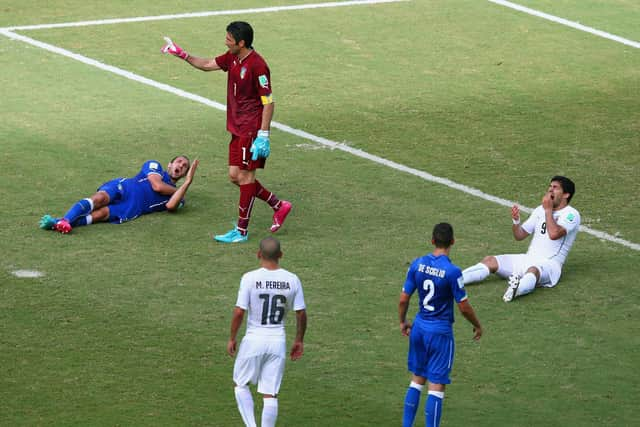

During the group stages of the 2014 World Cup, Suarez bit Italy centre back Giorgio Chiellini, causing a massive stir off the pitch.
The striker, who previously bit Branislav Ivanovic during a Premier League game back in April 2013, was suspended from all football-related activity for four months.
In addition, he was banned for nine international matches, which ruled him out of the rest of the World Cup in Brazil.
2) Tyson vs Holyfield II - Tyson bites opponent
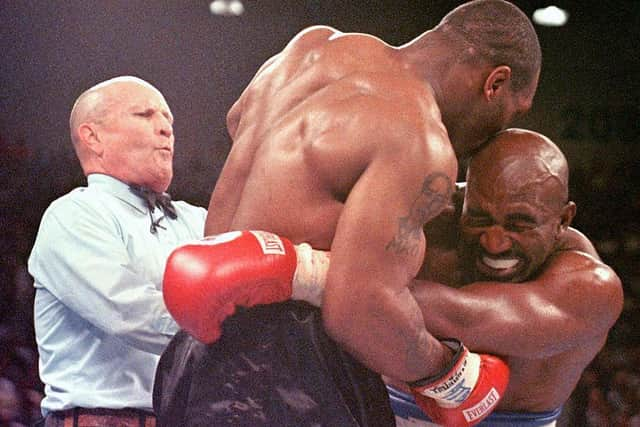

Advertisement
Hide AdAdvertisement
Hide AdThe first fight between these two heavyweights took a surprising turn — Holyfield was awarded the win after doing the unthinkable and dominating Tyson for eleven rounds — which made what followed even more controversial.
Meeting again in 1997, the bout had a bad-tempered start after Holyfield caught Tyson with a headbutt. Iron Mike's reaction was to bite a chunk out of his opponent's ear, earning a round 3 loss, a $3 million fine and a disqualification from boxing.
3) Ben Johnson cheats his way to gold in 1988 Olympics
Canadian sprinter Ben Johnson won gold in the 1988 Seoul Olympic Games, beating his own world record in the process.
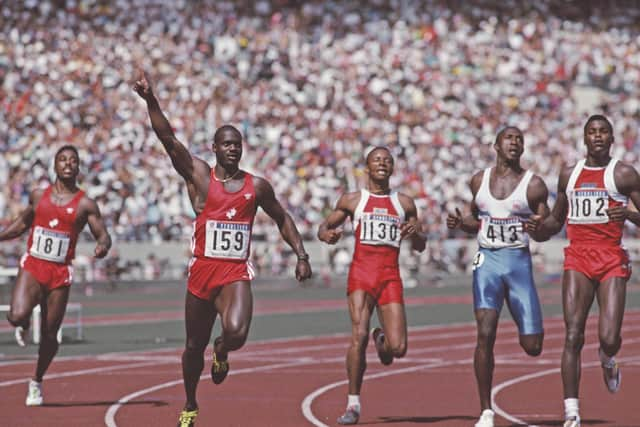

However, subsequent urine samples revealed stanozolol, an anabolic steroid. Almost as quickly as he had won, Johnson's medal was taken away.
4) Black Rights Movement - 1968 Olympic protest
Advertisement
Hide AdAdvertisement
Hide AdDuring their medal ceremony in the Olympic Stadium in Mexico City on October 16, 1968, two African-American athletes Tommie Smith and John Carlos each raised a black-gloved fist during the playing of the US national anthem
While on the podium, Smith and Carlos, who had won gold and bronze medals respectively in the 200m, turned to face the US flag and then kept their hands raised until the anthem had finished.
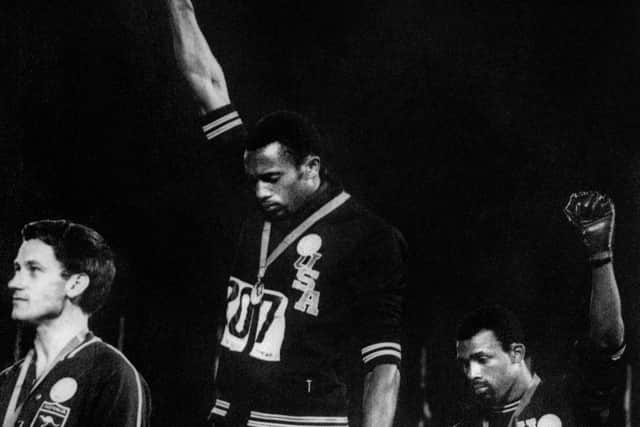

In addition, Smith, Carlos, and Australian silver medalist Peter Norman all wore human-rights badges on their jackets.
5) Jesse Owens - Nazis propaganda movement embarrassed by US sprinter
Advertisement
Hide AdAdvertisement
Hide AdThe 1936 Berlin Olympics were held in a tense, politically charged atmosphere amidst the rise of the Nazis.
Fearing a mass boycott, the International Olympic Committee pressured the German government and received assurances that qualified Jewish athletes would be part of the German team and that the Games would not be used to promote Nazi ideology.
Adolf Hitler’s government, however, routinely failed to deliver on such promises and used the games to promote their ideas.
But Hitler was left embarrassed by the genius of black American Jesse Owens, who won three individual gold medals. His success was considered a particular blow to Hitler’s Aryan ideals.
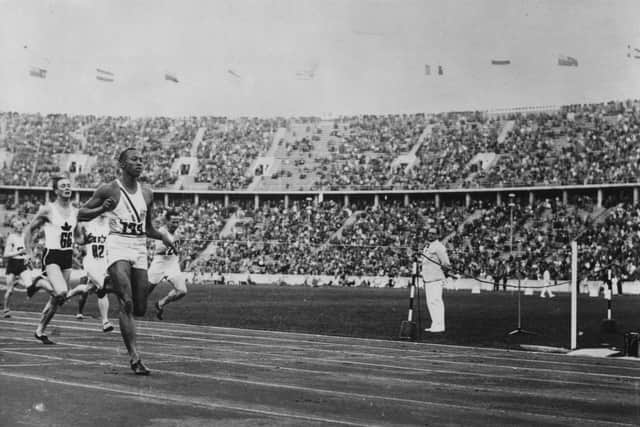

Advertisement
Hide AdAdvertisement
Hide Ad6) Colin Kaepernick - Protest sparks massive debut but ends NFL career
In the 49ers third preseason game of the 2016 season, San Francisco quarter-back Colin Kaepernick was noticed sitting down during the playing of "The Star-Spangled Banner" as opposed to the tradition of standing.
It was the start of a protest movement that spread throughout the NFL as black athletes said they would not show pride in a flag for a country that oppresses black people and people of colour.
The protest drew stinging criticism from the Whitehouse and led to his departure from the 49ers.
Advertisement
Hide AdAdvertisement
Hide AdKaepernick went unsigned through the off-season and 2017 training camps, leading to allegations that he was being blackballed because of his on-field political statements as opposed to his performance
In October 2017, Kaepernick filed a grievance against the NFL, accusing league owners of collusion to keep him out of the league, which was settled out of court On February 15, 2019
Before November 16, 2019, Kaepernick had not had an NFL tryout since becoming a free agent in 2017.
7) The Bodyline series
Ashes cricket is arguably the most hotly contested form of the game, a claim supported by this example.
Advertisement
Hide AdAdvertisement
Hide AdIn the 1932-33 series in Australia, led by Douglas Jardine, England pioneered the controversial 'bodyline' ball — short-pitched down the leg side, and potentially lethal. The tactic surely helped England win the series, but not without fostering some ill-feeling between the teams.
Critics considered the tactic intimidating and physically threatening, to the point of being unfair in a game that was supposed to uphold gentlemanly traditions
Business between the two countries was adversely affected as citizens of each country avoided goods manufactured in the other.
In 1934–35 a statue of Prince Albert in Sydney was vandalised, with an ear being knocked off and the word "BODYLINE" painted on it.
8) HAND OF GOD - 1986 - the pathetic to the sublime
Advertisement
Hide AdAdvertisement
Hide AdThe 1986 quarter-final between England and Argentina is still one of the most controversial moments in football history, let alone the World Cup.
The second half of the match in Mexico City saw one of the most infamous incidents ever followed by one of the most famous goals of all time.
Maradona punched the ball into the net when jumping up against England goalkeeper Peter Shilton to put Argentina 1-0 up after officials failed to spot the offence.
Just four minutes later, he then wowed the world with the 'Goal of the Century' as he picked up the ball in his own half before dashing past four England players to give Argentina a 2-0 lead.
Advertisement
Hide AdAdvertisement
Hide AdThe game finished 2-1 with Gary Lineker scoring a consolation goal.
9) 1966 World Cup final - was it over the line?
Few moments in sporting history have provoked such fierce debate as Geoff Hurst's second goal against West Germany in the 1966 final at Wembley.
With the game on a knife-edge at 2-2 in extra-time, the deadlock had again been broken in the 101st minute in the most dramatic fashion possible.
Hurst, having received a cross from Alan Ball in the penalty area, swivelled quickly before unleashing a fierce shot that bounced straight down after striking the underside of the crossbar.
Advertisement
Hide AdAdvertisement
Hide AdReferee Gottfried Dienst was uncertain whether the ball had crossed the goalline and decided to consult linesman Tofiq Bahramov. England fans inside the stadium held their breath... and after a brief moment of conversation, the goal was awarded.
Comment Guidelines
National World encourages reader discussion on our stories. User feedback, insights and back-and-forth exchanges add a rich layer of context to reporting. Please review our Community Guidelines before commenting.